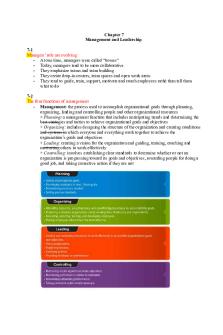Chapter 1 understanding assessment PDF

| Title | Chapter 1 understanding assessment |
|---|---|
| Course | Educational Assessment |
| Institution | Western Governors University |
| Pages | 2 |
| File Size | 84.8 KB |
| File Type | |
| Total Downloads | 44 |
| Total Views | 143 |
Summary
accommodations and modifications, due process rights, informed consent...
Description
Chapter 1 (“Understanding Assessment”) of Assessing Children with Special Needs DEFINITIONS 1. Assessment – global term for observing, gathering, recording, and interpreting information to answer questions and make legal and instructional decisions about students 2. Assessment approach – the way information is collected for making an educational decision; portfolios, authentic assessment, etc. 3. Response to intervention – an intervention process and prereferral process for sped 4. Accommodations – changes to education program and assessment procedures that do not substantially alter instructional level, content, or assessment criteria 5. Modifications – changes or adaptations made to educational programs that alter the level, content, and/or assessment criteria; example, complete half the assessment tasks, read condensed version of a paragraph 6. Development delay – a delay in one or more areas of development; physical (fine motor skills, gross motor skills), cognitive, communication, social or emotional, adaptive development 7. Individualized family service plan – similar to IEP; mandated that all families of young children (birth to 2) have one; a written document that specifies the plan for services and is guided by the family’s concerns, priorities, and resources; used until entry to kindergarten as long as consistent with state policy and parents agree 8. Alternative assessment – based on modified achievement standards for students with persistent academic ability 9. Family Educational Rights and Privacy Act – PL 93-380; no educational agency may release student information without written consent from parents; consent must specify which records to release, reasons why releasing, and to whom they are being released Accommodations and Modifications
Need to be documented and described on test report Each state has certain accommodations allowed on standardized tests
IEP team cannot reevaluate sooner than once a year unless parents and school agree otherwise
must reevaluate at least once every three years unless parents and school agree it’s unnecessary
Due Process Requirements
written notice to parents of proposal to initiate or change identification, evaluation, or educational placement can review records regarding assessment and placement may get individual evaluation by qualified examiner not employed by the school at no cost to the parent – public school pays right to impartial hearing conducted by officer when disagreements arise
Informed Consent 1. present information so that it is easily understood 2. provide alternatives 3. identify risks and benefits
Chapter 1 (“Understanding Assessment”) of Assessing Children with Special Needs 4. accept or consent to proposed information required before assessments and development of multiyear IEP unless parents have not responded, parental rights have been terminated, or unknown where parents are...
Similar Free PDFs

Chapter 1 - Health assessment
- 5 Pages

Chapter 03 Understanding Buyers
- 13 Pages
Popular Institutions
- Tinajero National High School - Annex
- Politeknik Caltex Riau
- Yokohama City University
- SGT University
- University of Al-Qadisiyah
- Divine Word College of Vigan
- Techniek College Rotterdam
- Universidade de Santiago
- Universiti Teknologi MARA Cawangan Johor Kampus Pasir Gudang
- Poltekkes Kemenkes Yogyakarta
- Baguio City National High School
- Colegio san marcos
- preparatoria uno
- Centro de Bachillerato Tecnológico Industrial y de Servicios No. 107
- Dalian Maritime University
- Quang Trung Secondary School
- Colegio Tecnológico en Informática
- Corporación Regional de Educación Superior
- Grupo CEDVA
- Dar Al Uloom University
- Centro de Estudios Preuniversitarios de la Universidad Nacional de Ingeniería
- 上智大学
- Aakash International School, Nuna Majara
- San Felipe Neri Catholic School
- Kang Chiao International School - New Taipei City
- Misamis Occidental National High School
- Institución Educativa Escuela Normal Juan Ladrilleros
- Kolehiyo ng Pantukan
- Batanes State College
- Instituto Continental
- Sekolah Menengah Kejuruan Kesehatan Kaltara (Tarakan)
- Colegio de La Inmaculada Concepcion - Cebu













